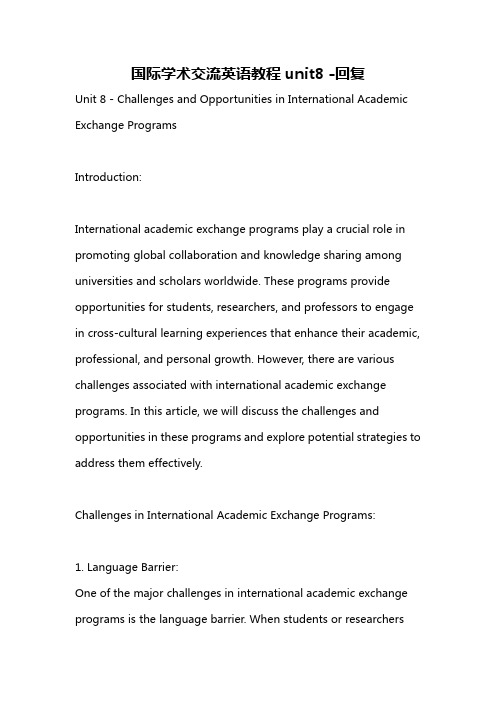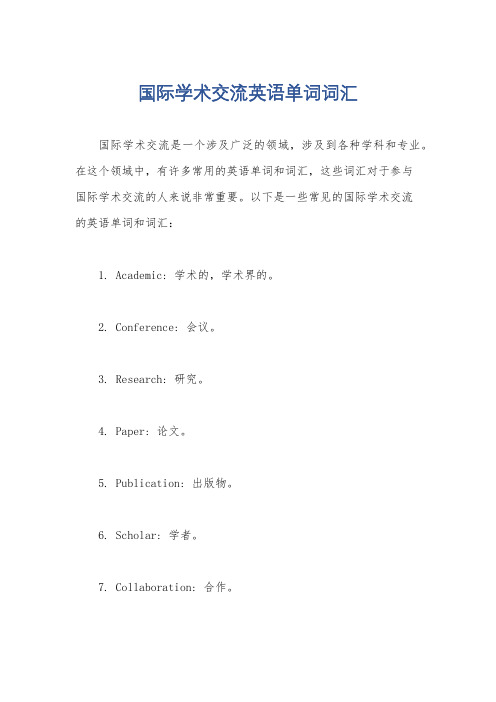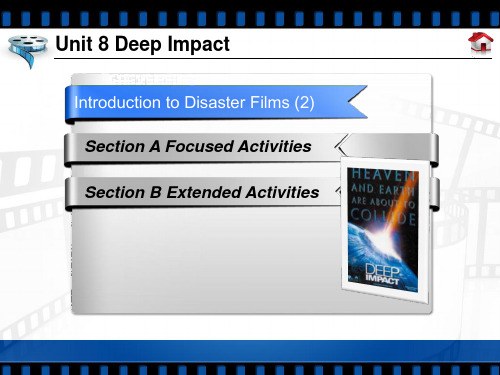学术交际英语8
国际学术交流英语教程unit8 -回复

国际学术交流英语教程unit8 -回复Unit 8 - Challenges and Opportunities in International Academic Exchange ProgramsIntroduction:International academic exchange programs play a crucial role in promoting global collaboration and knowledge sharing among universities and scholars worldwide. These programs provide opportunities for students, researchers, and professors to engage in cross-cultural learning experiences that enhance their academic, professional, and personal growth. However, there are various challenges associated with international academic exchange programs. In this article, we will discuss the challenges and opportunities in these programs and explore potential strategies to address them effectively.Challenges in International Academic Exchange Programs:1. Language Barrier:One of the major challenges in international academic exchange programs is the language barrier. When students or researchersfrom different countries come together, they often face difficulties in communicating effectively due to language differences. This can hinder their ability to collaborate, share ideas, and fully engage in the academic discourse. It is essential to address this challenge by providing language support services such as language courses, translation tools, and language exchange programs to ensure effective communication among participants.2. Cultural Differences:Another significant challenge in international academic exchange programs is cultural differences. Participants from different cultural backgrounds may have diverse perspectives, values, and communication styles, which can lead to misunderstandings and conflicts. It is crucial to promote cultural sensitivity and understanding among participants through pre-departure orientations, cultural awareness training, and intercultural workshops. These initiatives will help create a harmonious and inclusive environment for participants to learn from each other's cultures and perspectives.3. Academic Disparity:International academic exchange programs often involvecollaborations between institutions with varying academic standards and curriculum structures. This can create challenges for participants in terms of adapting to different teaching and learning methods, evaluating academic achievements, and meeting the academic requirements of the host institution. To address this challenge, it is essential to establish clear guidelines and expectations for participants and provide academic support services such as tutoring, mentorship programs, and credit transfer assistance to ensure a smooth transition and academic success.4. Funding and Accessibility:Financial constraints and limited accessibility are significant challenges faced by many individuals who wish to participate in international academic exchange programs. Many students and researchers are unable to afford the cost of travel, accommodation, and living expenses associated with these programs. Additionally, individuals from underrepresented regions or marginalized communities may face barriers in accessing these opportunities due to systemic inequalities. To overcome these challenges, it is necessary to explore funding options such as scholarships, grants, and sponsorships targeted towards individuals with financial difficulties. Moreover, efforts should be made to ensure inclusivityand diversity in participant selection by actively reaching out to underrepresented communities and regions.Opportunities in International Academic Exchange Programs:1. Knowledge and Skill Enhancement:International academic exchange programs offer unique opportunities for participants to expand their knowledge and skills. By immersing themselves in different academic environments, participants can gain exposure to diverse perspectives, research methodologies, and approaches to problem-solving. This exposure broadens their intellectual horizons and equips them with a global mindset, adaptability, and critical thinking skills. Additionally, participants can utilize state-of-the-art facilities, resources, and expertise available at the host institution to enhance their research capabilities and contribute to cutting-edge discoveries.2. Networking and Collaboration:International academic exchange programs provide an excellent platform for networking and collaboration. Participants have the opportunity to connect with scholars, researchers, and professionals from different parts of the world, enabling them toestablish valuable academic and professional relationships. These relationships can lead to collaborative research projects, joint publications, and exchange of ideas even beyond the duration of the program. Networking and collaboration through international exchange programs can significantly enhance participants' academic and career prospects.3. Intercultural Competence:Engaging in international academic exchange programs fosters the development of intercultural competence among participants. The exposure to different cultural practices, social norms, and perspectives enhances their ability to navigate and work effectively in diverse and multicultural environments. This skill is highly valued in today's globalized world and is essential for success in various academic and professional fields. Intercultural competence gained through international exchange programs equips participants with the ability to adapt, communicate, and collaborate across cultures, making them more competitive and sought-after in the job market.Conclusion:International academic exchange programs offer numerouschallenges and opportunities for individuals seeking cross-cultural learning experiences. While language barriers, cultural differences, academic disparities, and funding limitations pose challenges, these can be effectively addressed through language support, cultural sensitivity training, academic support services, and inclusive selection processes. In international academic exchange programs, participants have the opportunities to enhance their knowledge and skills, expand their networks, and develop intercultural competence. By recognizing and effectively addressing the challenges and capitalizing on the opportunities, international academic exchange programs can continue to foster global collaboration and contribute to the advancement of knowledge and understanding across borders.。
国际学术交流英语单词词汇

国际学术交流英语单词词汇国际学术交流是一个涉及广泛的领域,涉及到各种学科和专业。
在这个领域中,有许多常用的英语单词和词汇,这些词汇对于参与国际学术交流的人来说非常重要。
以下是一些常见的国际学术交流的英语单词和词汇:1. Academic: 学术的,学术界的。
2. Conference: 会议。
3. Research: 研究。
4. Paper: 论文。
5. Publication: 出版物。
6. Scholar: 学者。
7. Collaboration: 合作。
8. Presentation: 演讲,展示。
9. Abstract: 摘要。
10. Peer review: 同行评议。
11. Citation: 引用。
12. Thesis: 论文,论题。
13. Dissertation: 学位论文。
14. Plagiarism: 抄袭。
15. Academic integrity: 学术诚信。
16. Grant: 资助金,补助金。
17. Symposium: 座谈会,研讨会。
18. Panel: 小组讨论。
19. Academic journal: 学术期刊。
20. Academic writing: 学术写作。
这些词汇涵盖了国际学术交流中的各个方面,包括会议、研究、出版、合作等。
在国际学术交流中,熟悉并正确运用这些词汇是非常重要的,可以帮助人们更好地参与到国际学术交流中去。
同时,这些词汇也反映了国际学术交流的复杂性和多样性,需要人们具备丰富的词汇量和专业知识才能更好地融入这个领域。
希望以上信息对你有所帮助。
研究生学术英语答案Unit 8

C. every step up the ladder of science; D. the tools to wage this terrible battle.
Section A
Part 1 Lead-in
E. the very graveshing that has nourished our souls, and ( A) elevated our species The human thirst for excellence, knowledge; ( C) even the wars that we’ve fought have provided us ( D) We are faced with
Section A
Part 2 Watching & Listening
Clip 1 MSNBC reporter Jenny Lerner investigates the resignation of the United States Secretary of the Treasury and his connection to an “Ellie”. She discovers that Ellie is an acronym: “E.L.E.”. Because of Lerner’s investigation, President of the United States Tom Beck advances the announcement of the grim facts. (4'03")
报纸电视等引人注目的头条消息halebopp彗星名hale和bopp两人所发现standupn
Unit 8 Deep Impact
Introduction to Disaster Films (2) Section A Focused Activities Section B Extended Activities
外研社学术英语口语教程_配套课件Unit 8课件

Question 2: What do you think may cause the differences?
Answers may vary. Students can seek answers from the factors of history, philosophy, culture, aesthetic orientation, etc.
Teaching Objectives
To better understand Chinese Culture and Western Culture
To know the the major differences between Chinese Culture and Western Culture
UNIT 8 Chinese Culture vs.
Western Culture
CONTENTS
目
01 Teaching objectives
录
02 Lead-in
03 Listening and Speaking 04 Reading and Speaking 05 PBL project
01 Teaching ObjectivesTa来自k 3: Discussion
3. In which aspect do you think the two cultures can learn from each other?
The cultures of West and East are different, but clearly, they have a lot to learn from each other. Ancient China contributed the four great inventions to the world, and they influenced the west significantly. From the late 19th century, China searched for ways to adapt Western learning and technology while preserving Chinese values. As China opened itself to the whole world in recent decades, China has absorbed many things from the west that can help it to be strong and prosperous, such as business, technology, architecture, music, etc. As China is growing rapidly, it began to exert its influence on the west in return. For example, Chinese products are popular in the west, Chinese food becomes common in the western families, traditional Chinese medicine came to widespread attention by westerners. With the international exchange and cultural integration, China and the West will continue their learning practice from each other that can benefit people on both sides.
学术英语(医学)_Unit 8

Text A
Critical reading and thinking
Topics for presentation
1. How are research and practice related to each other? (Pre. 1) Practice: • interventions solely to enhance the well-being of an individual patient or client and that have a reasonable expectation of success. • to provide diagnosis, preventive treatment or therapy to particular individuals
•
•
Language building-up – Signpost language – Vocabulary test Suggested answers
•
Unit 8 Principles of Biomedical Ethics
Text A
Critical reading and thinking
Conception 2: ______________ ______________ ______________ ___
A dilemma: involvement of prisoners as subjects of research
an equal share
according to __________ ______
Unit 8 Principles of Biomedical Ethics
学术综合英语Unit8分析

"Writing for Social Scientists: How to Start and Finish Your Thesis, Book, or Article" by Robert Boice: This book is geared towards students of the social sciences and offers practical advice on writing academic papers, including tips on researching, outlining, and revising.
03
理解这些词汇和短语的用法和语境,能够正确运用在写作和口语中。
04
通过例句加深对这些词汇和短语的记忆和理解。
02
03
04
01
Analysis of complex sentence patterns
复杂句型分析
学习Unit 8中出现的复杂句型,如并列句、复合句、省略句等。
掌握这些句型的语法结构和特点,能够识别和运用。
Theme 1
Writing Skills Development - Focus on essay writing and report writing, including structure, organization, and language usage.
Theme 2
Academic Speaking and Listening - Practical exercises in speaking and listening in academic contexts, such as seminars and group discussions.
国际学术交流英语教程unit8

Unit 8: Academic Writing1. Introduction to Academic WritingAcademic writing is a specific style of writing used in various fields of study, including the humanities, social sciences, and natural sciences. It is characterized by its formal tone, structured organization, and use of evidence to support arguments. Academic writing is essential for scholars and researchers tomunicate their ideas and findings effectively to a wider audience.2. The Structure of an Academic PaperAn academic paper typically follows a structured format, including an introduction, literature review, methodology, results, discussion, and conclusion. Each section serves a specific purpose, such as providing background information, presenting research methods, and interpreting the results. This organization helps readers navigate the content and understand the progression of the author's argument.3. Academic Language and StyleAcademic writing requires the use of precise and formal language to conveyplex ideas accurately. It is important to avoidcolloquial expressions, slang, and contractionsmonly used in informal writing. Additionally, writers should adhere to the conventions of academic style, such as using appropriate vocabulary, avoiding personal pronouns, and employing formal grammar and punctuation.4. Citations and ReferencingCiting sources accurately is a crucial aspect of academic writing. Writers must acknowledge the ideas and research of others by providing citations within the text and creating aprehensive list of references at the end of the paper. Different disciplines may use specific citation styles, such as APA, MLA, or Chicago, so it is essential to follow the guidelines of the relevant academicmunity.5. Critical Thinking and AnalysisAcademic writing requires a high level of critical thinking and analysis. Writers must evaluate existing research, identify gapsin knowledge, and presentpelling arguments based on evidence. This process involves synthesizing information from multiple sources, evaluating the strengths and weaknesses of different perspectives, and developing original insights to contribute to the scholarly discourse.6. Writing StrategiesEffective academic writing involves several strategies to convey information clearly and persuasively. These may include outlining the m本人n points, using transitional phrases to connect ideas, structuring paragraphs logically, and revising the draft to refine the argument and language. Additionally, writers should pay attention to coherence and cohesion to ensure that the paper is well-organized and easy to follow.7. Academic Writing in Different DisciplinesWhile academic writing sharesmon principles across disciplines, there are also specific conventions and expectations within each field of study. For example, the writing style in the humanities may differ from that in the natural sciences, and the types of evidence used in social sciences may vary from those in engineering or medicine. Writers should familiarize themselves with the norms of their particular discipline to produce effective academic papers.8. ConclusionIn conclusion, academic writing is a fundamental skill for scholars and researchers tomunicate their ideas and contributeto the advancement of knowledge. By understanding the principles of academic writing, mastering the structure and language of academic papers, and honing critical thinking and analysis, writers can produce impactful and influential scholarly work.。
学术英语(人文社科类)Unit 8

f. traits of a country that attract other countries to e emulate it or otherwise follow its lead through the power of example
7 coercive g. the sum of a country’s power assets that determine diplomacy b its potential for exercising international power 8 national h. the willingness of a country to use its power capacity willpower h to influence global events
Text A
Suggested answers
Language building-up
2
Task 2 Signpost language
Column A Column B a
1. balance of power
2. soft power 3. power capacity
a. a concept that describes the degree of equilibrium (balance) or disequilibrium (imbalance) of power in the global or regional system
used to obtain what we desire.
F 4 The more power a country has, the better it will become.
Unit 8
